Abstract
Although prior research shows that substantial proportions of African Americans hold conspiracy beliefs, little is known about the subgroups of African Americans most likely to endorse such beliefs. We examined the relationship of African Americans' sociodemographic characteristics to their conspiracy beliefs about HIV/AIDS and birth control. Anonymous telephone surveys were conducted with a targeted random-digit-dial sample of 500 African Americans (15-44 years) in the contiguous United States. Respondents reported agreement with statements capturing beliefs in HIV/AIDS conspiracies (one scale) and birth control conspiracies (two scales). Sociodemographic variables included gender, age, education, employment, income, number of people income supports, number of living children, marital/cohabitation status, religiosity and black identity. Multivariate analyses indicated that stronger HIV/AIDS conspiracy beliefs were significantly associated with male gender, black identity and lower income. Male gender and lower education were significantly related to black genocide conspiracy beliefs, and male gender and high religiosity were significantly related to contraceptive safety conspiracy beliefs. The set of sociodemographic characteristics explained a moderately small amount of the variance in conspiracy beliefs regarding HIV/AIDS (R2 range=0.07-0.12) and birth control (R2 range=0.05-0.09). Findings suggest that conspiracy beliefs are not isolated to specific segments of the African-American population.
Full text
PDF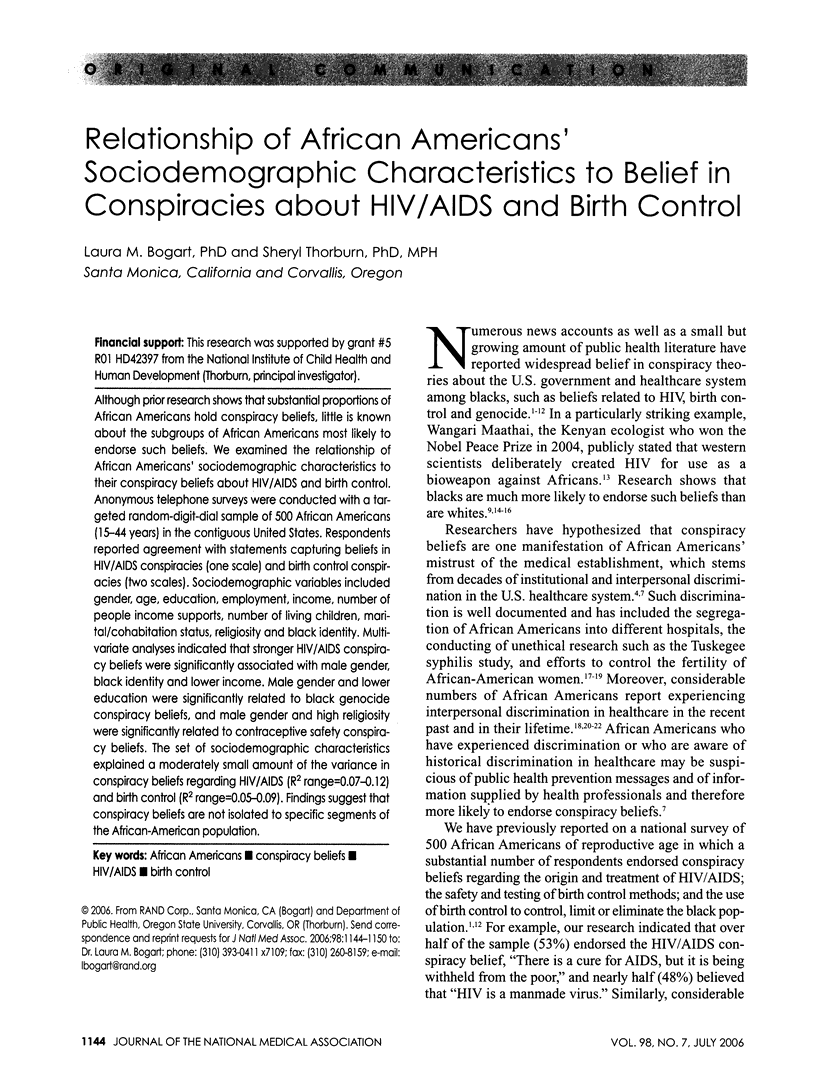
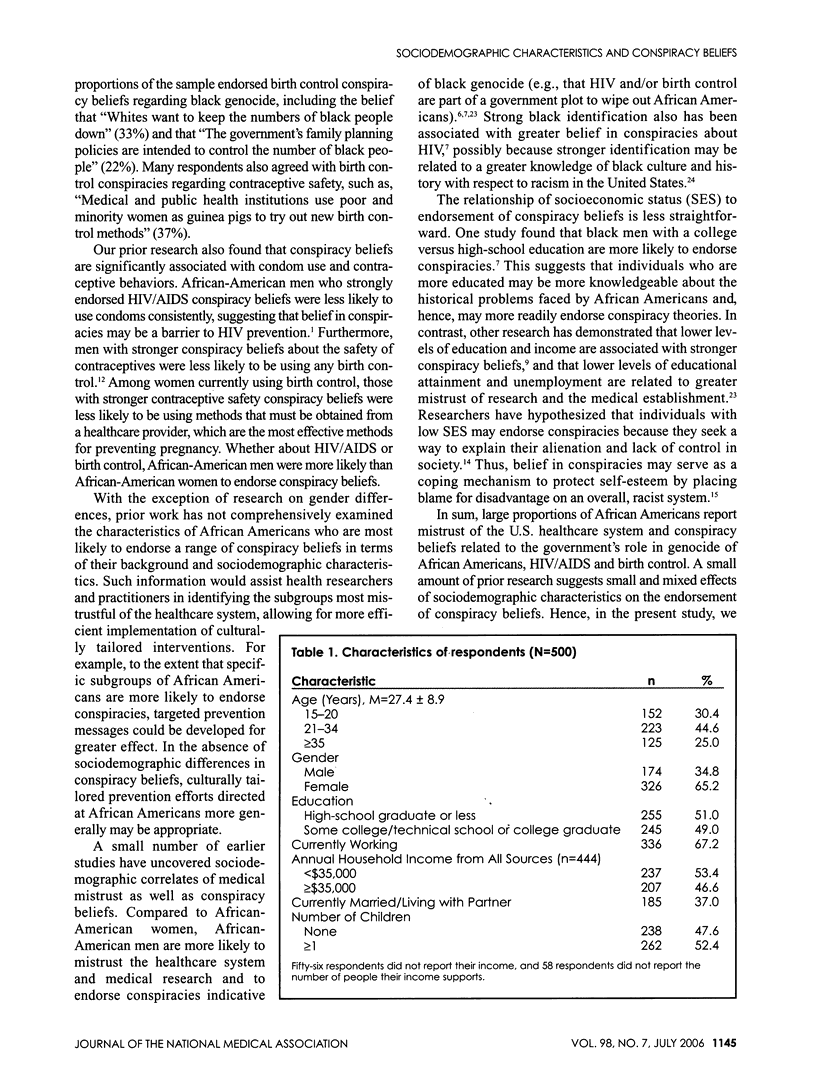
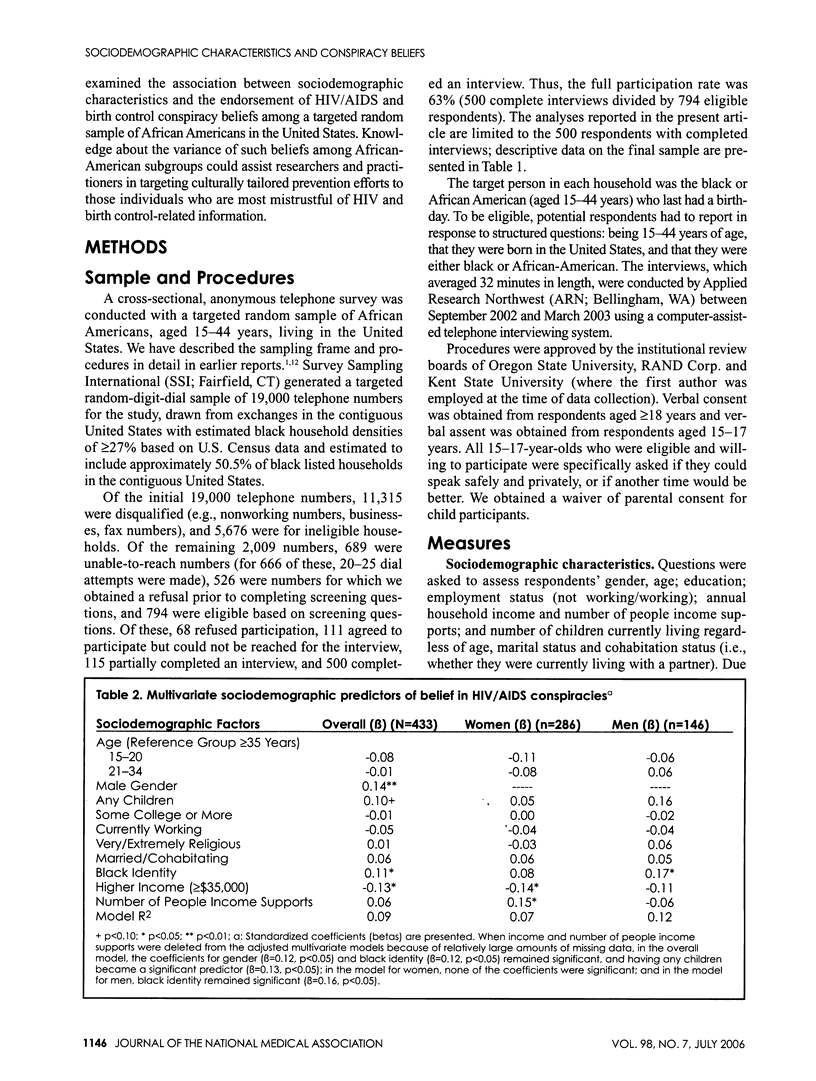
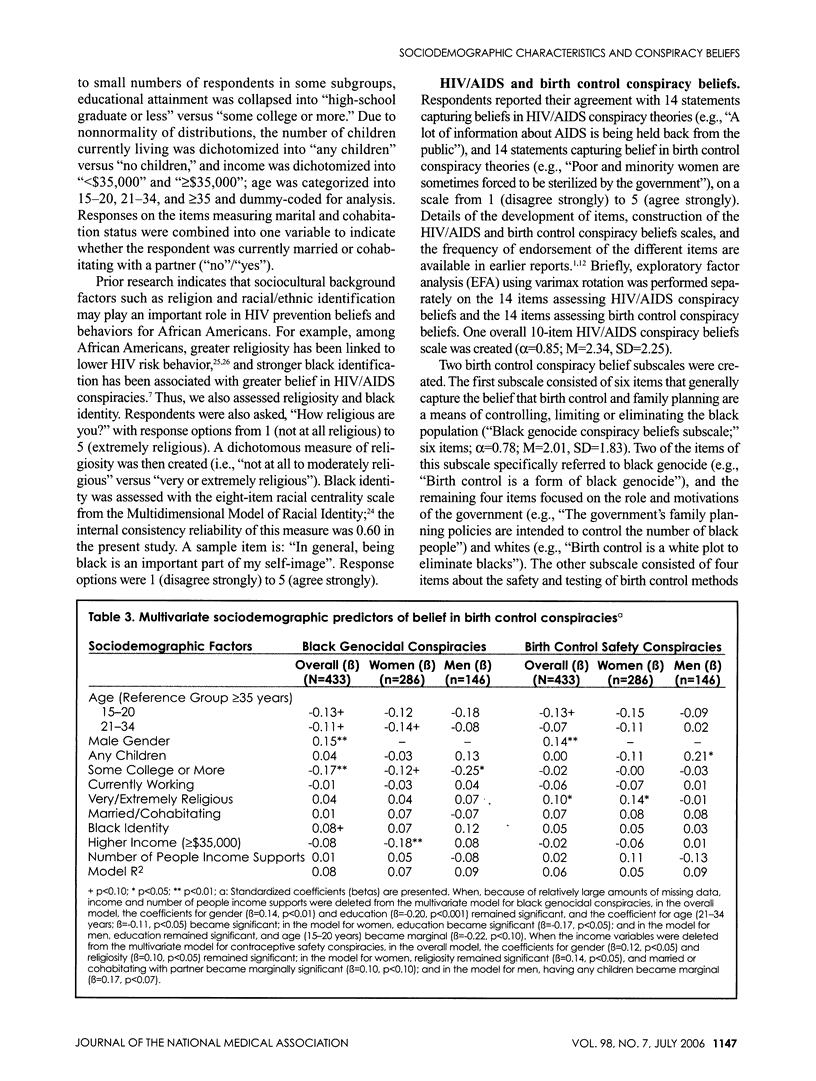
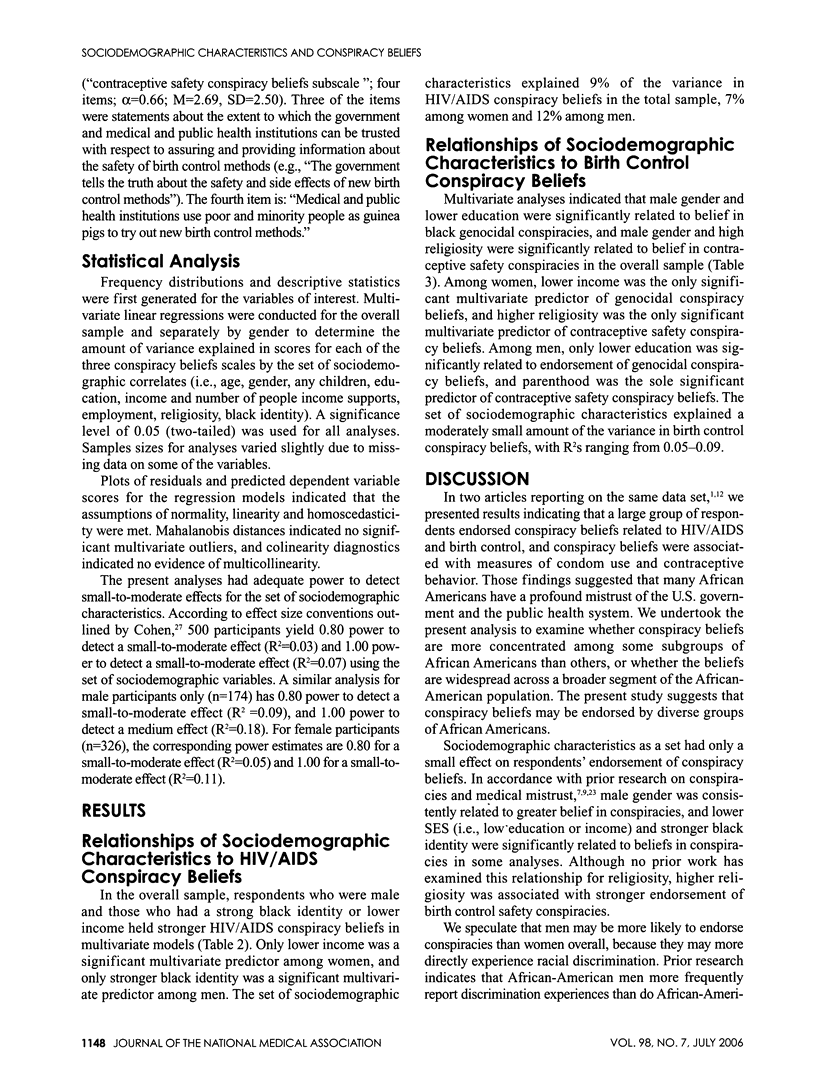
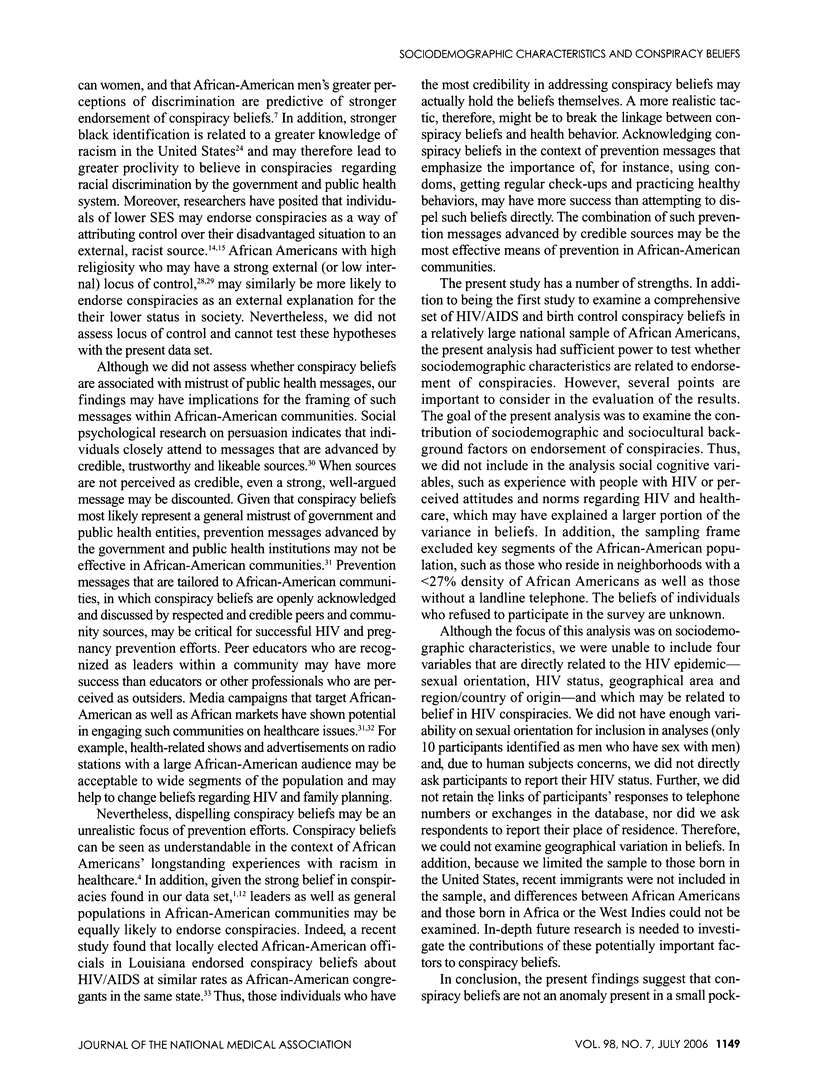
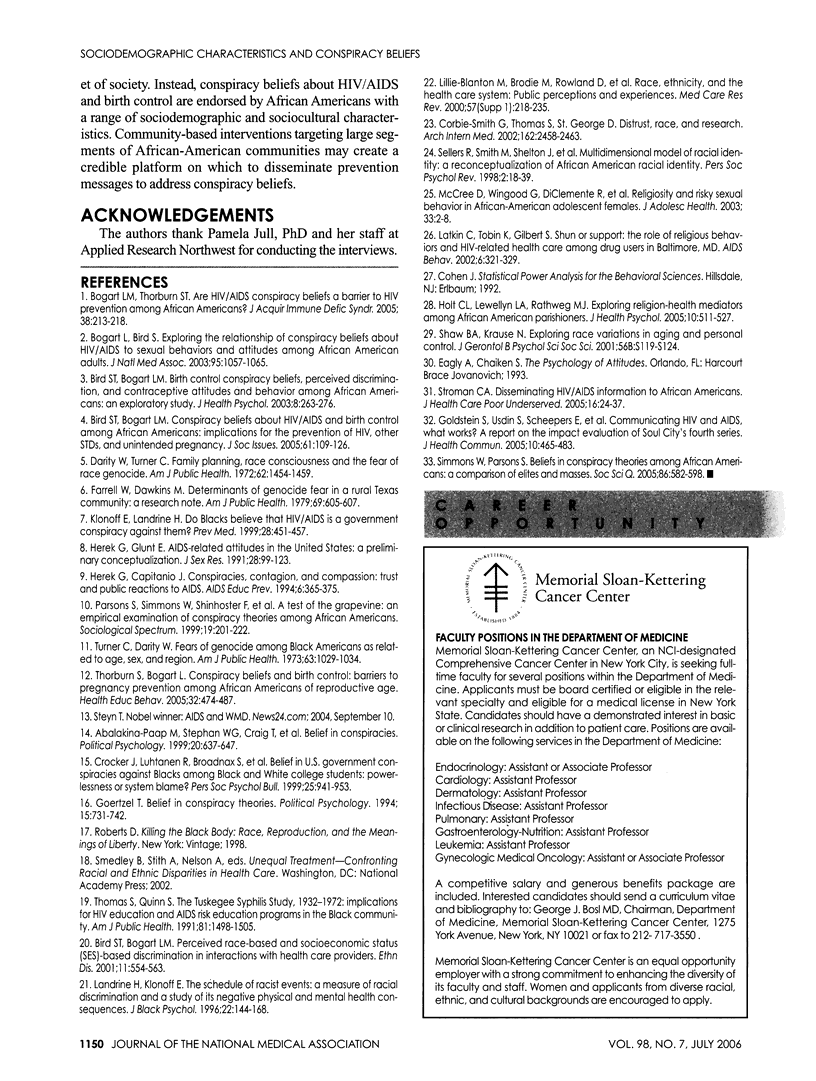
Selected References
These references are in PubMed. This may not be the complete list of references from this article.
- Bird S. T., Bogart L. M. Perceived race-based and socioeconomic status(SES)-based discrimination in interactions with health care providers. Ethn Dis. 2001 Autumn;11(3):554–563. [PubMed] [Google Scholar]
- Bird Sheryl Thorburn, Bogart Laura M. Conspiracy beliefs about HIV/AIDS and birth control among African Americans: implications for the prevention of HIV, other STIs, and unintended pregnancy. J Soc Issues. 2005 Mar;61(1):109–126. doi: 10.1111/j.0022-4537.2005.00396.x. [DOI] [PubMed] [Google Scholar]
- Bogart Laura M., Bird Sheryl Thorburn. Exploring the relationship of conspiracy beliefs about HIV/AIDS to sexual behaviors and attitudes among African-American adults. J Natl Med Assoc. 2003 Nov;95(11):1057–1065. [PMC free article] [PubMed] [Google Scholar]
- Bogart Laura M., Thorburn Sheryl. Are HIV/AIDS conspiracy beliefs a barrier to HIV prevention among African Americans? J Acquir Immune Defic Syndr. 2005 Feb 1;38(2):213–218. doi: 10.1097/00126334-200502010-00014. [DOI] [PubMed] [Google Scholar]
- Corbie-Smith Giselle, Thomas Stephen B., St George Diane Marie M. Distrust, race, and research. Arch Intern Med. 2002 Nov 25;162(21):2458–2463. doi: 10.1001/archinte.162.21.2458. [DOI] [PubMed] [Google Scholar]
- Darity W. A., Turner C. B. Family planning, race consciousness and the fear of race genocide. Am J Public Health. 1972 Nov;62(11):1454–1459. doi: 10.2105/ajph.62.11.1454. [DOI] [PMC free article] [PubMed] [Google Scholar]
- Farrell W. C., Jr, Dawkins M. P. Determinants of genocide fear in a rural Texas community: a research note. Am J Public Health. 1979 Jun;69(6):605–607. doi: 10.2105/ajph.69.6.605. [DOI] [PMC free article] [PubMed] [Google Scholar]
- Goldstein Susan, Usdin Shereen, Scheepers Esca, Japhet Garth. Communicating HIV and AIDS, what works? A report on the impact evaluation of Soul City's fourth series. J Health Commun. 2005 Jul-Aug;10(5):465–483. doi: 10.1080/10810730591009853. [DOI] [PubMed] [Google Scholar]
- Herek G. M., Capitanio J. P. Conspiracies, contagion, and compassion: trust and public reactions to AIDS. AIDS Educ Prev. 1994 Aug;6(4):365–375. [PubMed] [Google Scholar]
- Holt Cheryl L., Lewellyn Laura A., Rathweg Mary Jo. Exploring religion-health mediators among African American parishioners. J Health Psychol. 2005 Jul;10(4):511–527. doi: 10.1177/1359105305053416. [DOI] [PubMed] [Google Scholar]
- Klonoff E. A., Landrine H. Do blacks believe that HIV/AIDS is a government conspiracy against them? Prev Med. 1999 May;28(5):451–457. doi: 10.1006/pmed.1999.0463. [DOI] [PubMed] [Google Scholar]
- Lillie-Blanton M., Brodie M., Rowland D., Altman D., McIntosh M. Race, ethnicity, and the health care system: public perceptions and experiences. Med Care Res Rev. 2000;57 (Suppl 1):218–235. doi: 10.1177/1077558700057001S10. [DOI] [PubMed] [Google Scholar]
- McCree Donna Hubbard, Wingood Gina M., DiClemente Ralph, Davies Susan, Harrington Katherine F. Religiosity and risky sexual behavior in African-American adolescent females. J Adolesc Health. 2003 Jul;33(1):2–8. doi: 10.1016/s1054-139x(02)00460-3. [DOI] [PubMed] [Google Scholar]
- Sellers R. M., Smith M. A., Shelton J. N., Rowley S. A., Chavous T. M. Multidimensional model of racial identity: a reconceptualization of African American racial identity. Pers Soc Psychol Rev. 1998;2(1):18–39. doi: 10.1207/s15327957pspr0201_2. [DOI] [PubMed] [Google Scholar]
- Stroman Carolyn A. Disseminating HIV/AIDS information to African Americans. J Health Care Poor Underserved. 2005 Nov;16(4 Suppl B):24–37. doi: 10.1353/hpu.2005.0118. [DOI] [PubMed] [Google Scholar]
- Thomas S. B., Quinn S. C. The Tuskegee Syphilis Study, 1932 to 1972: implications for HIV education and AIDS risk education programs in the black community. Am J Public Health. 1991 Nov;81(11):1498–1505. doi: 10.2105/ajph.81.11.1498. [DOI] [PMC free article] [PubMed] [Google Scholar]
- Thorburn Sheryl, Bogart Laura M. Conspiracy beliefs about birth control: barriers to pregnancy prevention among African Americans of reproductive age. Health Educ Behav. 2005 Aug;32(4):474–487. doi: 10.1177/1090198105276220. [DOI] [PubMed] [Google Scholar]
- Turner C., Darity W. A. Fears of genocide among black Americans as related to age, sex, and region. Am J Public Health. 1973 Dec;63(12):1029–1034. doi: 10.2105/ajph.63.12.1029. [DOI] [PMC free article] [PubMed] [Google Scholar]



